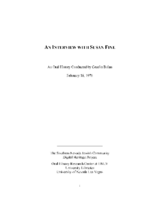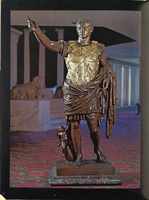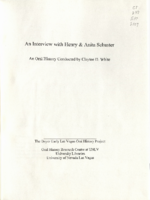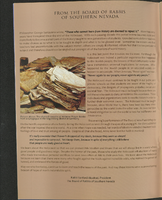Search the Special Collections and Archives Portal
Search Results

Transcript of interview with Susan Fine by Cecillia Boland, February 18, 1976
Date
Archival Collection
Description
Interview with Susan Greenspun Fine by Cecillia Boland on February 18, 1976. In this interview, Fine talks about growing up in Las Vegas and her schooling. The interview is geared towards the growth of Las Vegas from her childhood to her adulthood, including roads, air travel and medical facilities. She is the daughter of Hank and Barbara Greenspun, owners of the Las Vegas Sun newspaper, and discusses being involved in all the happenings around town because of that.
Text

Hotel room brochure from Caesars Palace, circa 1969
Date
Archival Collection
Description
Bound booklet with concierge information for Caesars Palace. The guide provides entertainment and dining information about the resort and casino, including room service menus and a telephone directory.
Text

Transcript of interview with Melody Stein by Barbara Tabach, August 16, 2016
Date
Archival Collection
Description
In this interview, Stein lovingly describes various forms and mediums of art, especially rubber stamping, which included starting and managing a related craft publication, National Stampagraphic, as well as working with polymer clay. She talks about her involvement with the local Polymer Clay Guild, of which she is president, and their various projects, including Bottles of Hope and Hearts for Heroes. Stein also discusses her teaching career at the Hebrew Academy and Adelson Educational Campus.
Text

Transcript of interview with Henry and Anita Schuster by Claytee White, March-April 2011
Date
Archival Collection
Description
In this oral history, the long married couple Henry and Anita Schuster recall the history of the 1930s and how they eventually met and created a life together. Their childhoods were distinctively different, but charter a future where they would inevitably meet. Born in Germany in 1926, Henry recalls the dawn of Hitler and the Nazism. His mother would arrange for his evacuation to France, where he would not know her fate or that of his two sisters for a number of years. Along with hundreds of other displaced children, he escaped to America and lived with relatives in Louisiana where he finished his schooling and joined the US Army. Anita on the other hand grew up with her family in New York. They share the story of meeting when she was 16, falling in love and marrying in 1948. They had four children and moved several times before settling in California. They retired to Las Vegas in 1993. Henry's recollections include childhood memories of the Holocaust and its affect on his family, including the loss of his mother and one of his sisters. Finding his surviving sister Bertel (Betty Kale) after the war is a heartwarming tale of survival. The Schusters are part of the approximately 300 members of the Holocaust Survivor Group that has settled in southern Nevada and Henry was President Emeritus of the group. He published his memoir, Abraham's Son-the Making of an American, in 2010.
Text

Transcript of interview with Raymonde Fiol by Barbara Tabach, August 12, 2015
Date
Archival Collection
Description
In this interview, Fiol discusses her experience as a a hidden child in the Holocaust and her family's history. She also talks about her involvement with the Las Vegas Holocaust survivors group.
Raymonde "Ray" Fiol is president of the Holocaust Survivors Group of Southern Nevada. A Jewish Holocaust survivor whose parents were killed in Auschwitz, Fiol was hidden by a Christian family of Resistance fighters during her childhood in Nazi-occupied Paris, France. She married American serviceman Phil Fiol and left Paris in 1957. The couple lived in New York City where she worked in inventory control. She retired to Las Vegas, Nevada around 2003 and became active in the local Holocaust Survivors Group. In 2007, she became president of the organization, which provides essential services to Holocaust survivors and helps them share their stories. Fiol is also a member of the Nevada Governor?s Advisory Council on Education Relating to the Holocaust and the coordinating council of Shoah International. Her dedication to preserving the memory of the Holocaust and caring for survivors earned her the Nevada Senior Citizen of the Year award from the Nevada Delegation of the National Silver Haired Congress and the Aging Services Directors Organization in 2014, and in 2013 she was named Mensch Volunteer of the Year by the Jewish Federation of Las Vegas. In this interview, Ray reflects upon her traumatic childhood experiences, and shares how she learned details of her family?s history from a woman in France who had researched the destiny of the local Jewish community. She also discusses her involvement with the survivors group, and the positive impacts of its outreach activities, as well as goals to ensure future generations learn about, and from, the Holocaust.
Text

Program, The Memory Book accompanying The Diary of Anne Frank premiere performance, February 2009
Date
Archival Collection
Description
This program accompanied the performance of the Broadway adaptation of the Diary of Anne Frank by the Nevada Conservatory Theatre. The program was produced by the Jewish Family Service Agency. It includes biographies of survivors living in Southern Nevada and an educational guide.
Text

Preprint, Where I Stand: The Record of a Reckless Man, by Hank Greenspun with Alex Pelle, 1966
Date
Archival Collection
Description
Book proof with annotations from editors in the margins.
Text

Transcript of interview with Judith D. Steele by Barbara Tabach, November 24, 2014
Date
Archival Collection
Description
In this interview she talks about student teaching in East Harlem, her teaching experiences in Providence, Rhode Island and the decision to reside in Las Vegas. When she was finally able to be promoted outside of the classroom, among her highlights was being Director of Special Education Programs and Services for the Clark County School District. In 1991, she served in a dual role as Manager of the Office of Development and Education Improvement for CCSD and Executive Director of the newly incorporated Clark County Public Education Foundation, an independent, non-profit organization established to improve public education in Southern Nevada. Among her many community activities is serving on numerous board and founder of the Henderson Arts Council.
Text

Transcript of interview with Valerie Wiener by Barbara Tabach, January 20, 2015
Date
Archival Collection
Description
Valerie Wiener is an accomplished state senator, business owner, president and founding member of the Public Service Institute of Nevada and the Valerie Wiener Foundation. She was born October 30, 1948 in Las Vegas, Nevada. Her service as senator for 16 years and her role as a public servant led her to become the first woman assistant majority leader of the state senate in Nevada. She graduated with a bachelor degree of Journalism at the University of Missouri/Columbia within the School of Journalism earning a Masters of Arts in Broadcast Journalism and a Master of Arts in Literature at the University of Illinois in Springfield while attending law school at McGeorge School of Law in Sacramento in the 1970s. Her generosity is also seen through scholarships and activities at the Louis Wiener Jr. Elementary School. In addition, Valerie is a professional speaker, consultant, and internationally published author. She is the recipients of many awards, such as: ?Women of Achievement Award? in Media; ?Healthy Schools Heroes?; ?Public Affairs Champion Award?; ?Legislator of the Year?, and the Nevada Secretary of State?s recipient of the ?Jean Ford Participatory Democracy Award.? She stays active through her commitment to the Nevada Senior Olympics for both Fitness and Weightlifting earning 17 gold medals from 1998 to 2007. In this interview, Wiener discusses her childhood and being raised in Las Vegas in the 1950s as well as the academic path that led her career into politics. She shares memorable insight into the life of her father, Louis Isaac Wiener, Jr., an accomplished attorney and business man who represented the infamous Benjamin ?Bugsy? Siegel during the construction and opening of the Flamingo Hotel and Casino in 1946. Throughout Wiener?s interview, she highlights the traditions of the small, but growing Las Vegas Jewish population in the 1960s. Among the people she recalls most vividly is her grandmother Kitty Wiener. Wiener also discusses her community service work and her life mantra of giving.
Text

Transcript of interview with Phyllis Friedman by Barbara Tabach, March 2, 2015
Date
Archival Collection
Description
In this interview, Phyllis Friedman reflects upon her extensive work with the ADL in Las Vegas. She discusses the city?s relatively low anti-Semitic activity, and how this allowed the Las Vegas ADL office to focus its efforts more broadly than in other cities. She also touches upon her family history, and how the community of Las Vegas has evolved since first visiting in 1963.
A Chicago native, Phyllis Friedman first came to Las Vegas in 1996 to become the Jewish Federation of Las Vegas? first foundation director. After two years, Friedman moved to year Los Angeles to work for ORT. Itching to get back to Las Vegas, in 2007, Friedman returned to the city to became director of the Nevada regional office of the Anti-Defamation League (ADL). In this position, she worked with schools as well as law enforcement, including the Federal Bureau of Investigation (FBI), teaching about tolerance and justice. She is a recipient of the FBI?s Las Vegas Division Director?s Community Leadership Award as well as the first awardee of Jewish Federation?s Jewish Professional of the Year. Three weeks into retirement, Friedman gave this interview, reflecting upon her extensive work with the ADL in Las Vegas. She discusses the city?s relatively low anti-Semitic activity, and how this allowed the Las Vegas ADL office to focus its efforts more broadly than in other cities. She also touches upon her family history, and how the community of Las Vegas has evolved since first visiting in 1963.
Text
